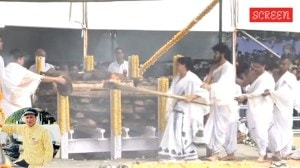Govt sets up committee to prepare quake report
NEW DELHI, JAN 31: Even as the bureaucratic quibble over the cause and extent of damage by the earthquake persisted in the Government depa...

NEW DELHI, JAN 31: Even as the bureaucratic quibble over the cause and extent of damage by the earthquake persisted in the Government departments, a small committee of expert seismologists was hurriedly set up to prepare a scientific document on the devastating Bhuj quake which has sledge-hammered several villages in Gujarat to dust.
“We have to act fast to record the still available data. There’s no time to loose. The expert team will be immediately visiting the epicentre and the adjoining areas for that purpose. The current data cannot be lost due to delay,” said Dr G.D. Gupta, additional secretary, Department of Science Technology (DST), explaining the hurry.
And no one denies that the committee, to be headed by the chairman of the Indian Meteorological Department, with members from Survey of India, National Geological Research Institute, Geological Survey of India and Univerity of Rourkee, has a humongous job on hand. And there aren’t enough funds available to take on the job.
“It is easy to accuse the Government, but the fact is that the Government does not have sufficient funds to undertake a detailed seismological study. The present state of knowledge is not good enough to predict earthquakes or suggest precautionary measures,” a senior official in the department protested.
The task is not just of recording and coordinating the information and data yet-to-be gathered from the devastated areas, but also of putting together and collating scientific data are pouring in from various scientific bodies the world over.
Taking into account the lack of resources and the lack of coordination between the Government organisations which has resulted in a dispute over the measure of the quake (on the Richter scale), the committee has been asked to strictly follow a three-pronged strategy.
To begin with, the committee will have to prepare a preliminary report based on field data which is to be followed by a more detailed scientific document. “We do it every time. We produced a document after Latur, after Chamoli. This time also, we will bring out a scientific document,” Gupta said in a rather matter-of-fact manner.
The committee will also require to immediately recommend scientific and technical studies on the earthquake prone zone. “It is not just a question of collecting data, there has to be technical recommendations on how best to tackle future quake situations and develop a quake-resistant habitat (for danger prone zones),” Gupta added.
Refuting charges that last month’s Kerala and Jabalpur quakes were warnings of what was on the way, the DST official said: “Those who are claiming that it could be predicted, are misleading people. There is no scientific authority in the world which can predict a earthquake.”
Photos



- 01
- 02
- 03
- 04
- 05




























